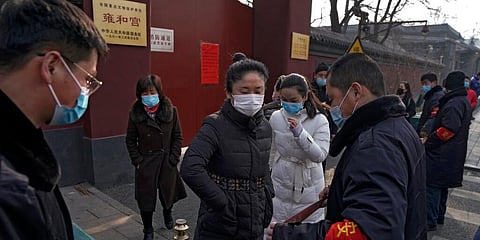

BEIJING: China is apparently giving more priority to its COVID-19 vaccine diplomacy than its domestic inoculation programme, with Beijing exporting more doses than the number of jabs administered in the country, according to a media report.
Figures compiled by the Hong Kong-based South China Morning Post show China shipped at least 46 million ready-made vaccines or their active ingredients around the world, as of Monday with hundreds of millions more doses to follow.
In contrast, the country's health authority said 40.52 million vaccine doses had been administered in China as of February 9, lower than the US, where more than 50 million jabs have been injected.
For a country known for mass mobilisations -- including testing millions for COVID-19 in a matter of days -- China has missed its target announced in early January to vaccinate 50 million people before the Lunar New Year, the Post report said.
China has officially been shut down from February 11 to 18 to celebrate the Chinese New Year and the Spring Festival.
Challenges to its domestic inoculation programme include vaccine hesitancy, limited supply and the lower effectiveness of the Chinese-made vaccines, the report said.
China early this month said it would provide 10 million COVID-19 vaccines to COVAX, the international vaccine alliance as it seeks to step-up its vaccine diplomacy amid growing anxiety in Beijing that India could become an engine for vaccine distribution to the world.
India, the largest producer of vaccines has already supplied batches of vaccines to a number of countries in the subcontinent including Nepal, Bangladesh, Sri Lanka and the Maldives, besides Myanmar, Mauritius and Seychelles.
India has also undertaken commercial supplies of the doses to a number of other countries, including Saudi Arabia, South Africa, Brazil and Morocco.
China has committed to supplying vaccines to 46 countries, including Sri Lanka, Nepal, The Maldives and Brazil which have already received the first batch of supplies from India.
Commenting on China's vaccine diplomacy, Huang Yanzhong, a global health expert at the US think tank, Council on Foreign Relations, said China's success in largely controlling the COVID-19 outbreak within its borders had reduced its need for vaccinations until recently.
"[China was] not initially paying too much attention to this, which was partly due to the limited vaccine production capacity in the country and the perceived low risk of infection. In a way it was a false sense of security," Huang told the Post.
"On the other hand, China could use [its vaccines] to become the global leader in ensuring equitable access to vaccines, bridging the gap between the developed and developing world. Certainly, this would help improve China's image and project soft power in those countries," he said.
A World Health Organization regulatory evaluation of Sinopharm and Sinovac vaccines is expected to be completed by March at the earliest, according to the UN body.
The lower efficacy rate of Chinese-made vaccines, 50.4 per cent for Sinovac and 79 per cent for Sinopharm, compared to more than 90 per cent for Pfizer and AstraZeneca vaccines, could also slow China's reaching of herd immunity, the report quoted public health experts as saying.
According to Huang, if China falls behind Western countries in achieving herd immunity, it would lead to an unwelcome scenario for Beijing, with life returning to normal and international travel resuming between some countries.
"China may still need to close its borders, that certainly would not improve China's international image. This would also mean China could no longer claim a superior disease control model," Huang said.